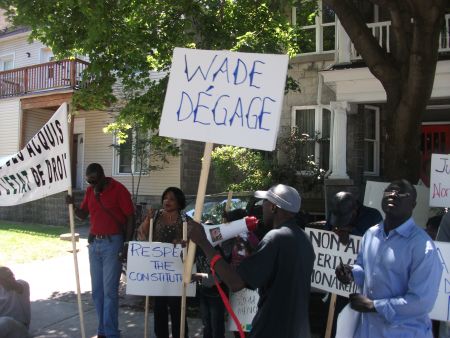OTTAWA--“Nadem, nadem, nadem!”
Chants of “He must go!” in Wolof – the indigenous Senegalese language – resounded through the usually quiet residential neighbourhood of Ottawa’s Sandy Hill, the home of the Senegalese embassy.
On Friday afternoon around 30 Senegalese-Canadians brought some of the spirit of the mass protests that have engulfed their country in west-Africa to the capital, as they marched through Ottawa and held a boisterous rally in front of the embassy to condemn Senegalese President Abdoulaye Wade as he tries to maintain his grip on power.
Senegal erupted in widespread protest on June 23rd, when President Wade tried to push a new law through parliament that would allow him to be easily re-elected in February 2012, by requiring only 25 percent of the popular vote. The constitution currently requires 50 percent of votes plus 1 to avoid a runoff. It also doesn’t allow for re-election beyond two terms, which Wade, in power since 2000, has already served.
Led by youth, rap groups and opposition politicians, tens of thousands in cities and towns across the country poured into the streets, united by the rallying cry of “Y’en a Marre” (“Enough is enough”). The capital of Dakar pulsed with anger and thousands marched on the National Assembly. Several government buildings and offices of the ruling PDS party were razed to ground, as well as offices of state electricity company Senelec.
Not a day goes by in Dakar without long electricity cuts, a source of enormous frustration for the population. In February President Wade told media that the Senegalese were “spoiled” with the amount of electricity they already receive.
Two people were killed and a hundred injured in the June 23rd protests, but by the afternoon President Wade was forced to announce that he would repeal his legislative proposal.
On Thursday, July 15th, however, Wade gave a widely-awaited speech in which – contrary to expectations – he announced he would still seek a third term, despite the constitutional prohibition. Angered, a group of Senegalese-Canadians who have named themselves the “June 23rd movement in Canada” mobilized through facebook to bus into Ottawa the next morning for a demonstration.
“We’re fed up with the situation,” says Akane Ndoye, a bank clerk who’s lived in Montreal for three years since immigrating.
“We want the country to move forward, so people can make a daily living, but [President] Wade doesn’t care anything about that. We need freedom from him, and we need fair elections.”
A flashpoint for protestors has been Wade’s attempt to groom his son as his predecessor. Wade has prepared the ground by appointing him a “super-minister” with a number of portfolios, despite his son’s loss in a bid to win a seat in the last elections.
Wade’s presidency has been marked by corruption and graft, impunity for ruling party members and police, scandals of land grabbing by the political elite, and deepening inequality and rampant poverty – all of which were on the mind of the protestors in Ottawa.
Signs read “Le Pays suffoque,” “Non au project dynastique du Wade,” “Coupures d’electricite: C’est assez,” and “Justice pour tous: Non a l’immpunite.”
As protestors chanted for a meeting with the Senegalese ambassador, one luxury car after another pulled up in front of the embassy. I joked with one protestor that the scene reminded us of Senegal, where the country’s stark disparities are in clear view on the streets with BMWs and Mercedes’ jockeying for position with horse and buggies and dilapidated trucks that function as crammed public transport.
Though the ambassador initially offered to meet only with 3 representatives, finally all the protestors were invited into the embassy, where several spoke before handing over a list of demands to the ambassador for transmission to the authorities in Senegal.
Though the matter did not figure high on demands in Senegal or Ottawa, President Wade has also been a close ally of the U.S. government, and has welcomed U.S. troops and trainers into the country to run “counter-terrorism” training operations.
There have been indications that the U.S. government is looking to establish its military’s highly controversial African Command (AFRICOM) in Senegal, which critics have condemned as an attempt to increase US military presence on the continent as the US heightens its interest in Africa’s oil and resources.
Canada has also been in secret negotiations with Senegal to establish a military facility in the country, as the Conservative government looks to expand their international military footprint.
There were no statements of concern forthcoming from Canada’s Minister of Foreign Affairs about Wade’s legislative initiatives or the severe police crackdown on protestors.
Canada exports about $30 million in goods yearly to the country, and is active in the mining, telecommunication, and energy and infrastructure sectors. The Canadian government also trains Senegalese police for participation in UN peacekeeping missions.
The Senegalese-Canadian June 23rd movement plans a further demonstration in Montreal on July 30th.




